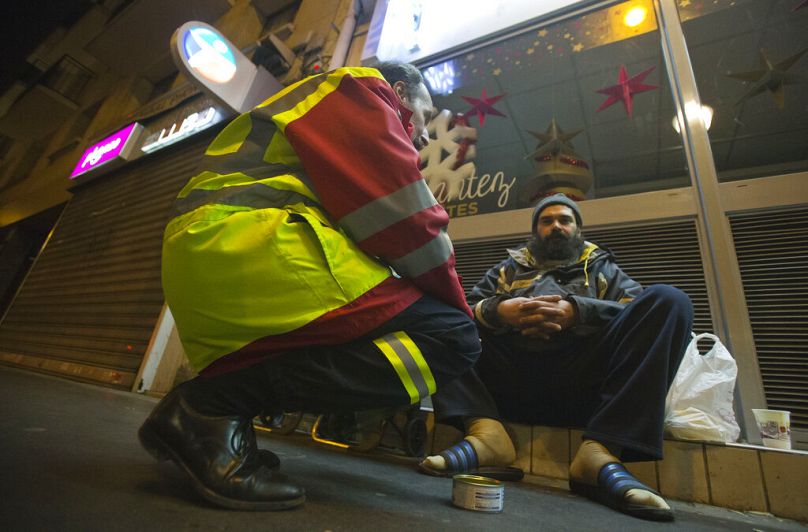Our message is clear: we can only achieve lasting change if all levels of government work together in a strategic partnership for action, Lyon Métropole's Vice President Renaud Payre writes.
Youth homelessness continues to increase in Europe’s cities. It is a deeply worrying trend that has been made worse by significant recent crises, including the impact of the COVID-19 pandemic, the increased cost of living and unaffordable housing.
Across Europe, local services are coming into contact with a rising number of young people facing homelessness, many of whom are dealing with a range of complex challenges.
For city leaders, this surge in youth homelessness is very concerning. Addressing youth homelessness is essential to breaking the lifelong cycle of chronic and repeated homelessness, and to investing in young people’s futures. It is also a key factor in the EU’s overall ambition to end homelessness by 2030.
In an effort to tackle the escalating issue, city governments have developed multiple initiatives to provide young people with support. But we recognise we cannot overcome this situation alone.
If we are to ensure lasting change, it is essential that the EU, national and local levels of government in Europe work together to develop ambitious strategic plans that will end youth homelessness once and for all.
Affecting the most vulnerable
When it comes to identifying EU-wide data on youth homelessness, the situation is challenging. Levels of youth homelessness reported by cities vary greatly, with numbers ranging from a few dozen to over a thousand.
However, a new report from Eurocities, "Ending youth homelessness in cities", has been able to shed more light on the situation.
Using data from 29 European cities, the report outlines the main issues that are pushing young people into homelessness, while also showing the positive steps cities are taking to respond to the crisis.
Notably, 96% of cities say that substance misuse is a main driver of youth homelessness, while 79% of cities point to health issues, including mental health difficulties.
For those who cannot rely on healthy family relationships, an experience of trauma and the challenges of navigating a complex social care system can make the transition to adulthood abrupt and difficult.
About 79% of cities mention domestic abuse, family breakdown and trauma. In addition, 96% of cities say that foster care leavers are particularly at risk.
The impact of global crises
The different crises Europe has recently faced are also significant factors in the escalating rates of youth homelessness.
Lockdowns during the COVID-19 pandemic led to job losses, particularly among young people in precarious jobs, impacting their ability to pay bills.
Record numbers of young people had to rely on food aid for survival while dropping out of school, also putting many at increased risk of homelessness.
The sharp rise in inflation and the subsequent cost of living crisis are mentioned by nearly all cities as major contributors to heightened levels of homelessness. According to local data, 92% of cities highlight the impact of unaffordable housing, linked with insufficient income.
In most countries, income levels have not risen, reducing young people’s incomes and forcing them to choose between rent, food, and energy bills. Their decreased budgets have also reduced their capacity to secure housing, particularly in highly competitive markets.
Cities’ innovative responses
Despite the myriad of challenges being experienced by young people facing homelessness, there are also many successful actions being implemented by city governments to provide support.
In Lyon Metropole, for example, we are increasing the availability of social and affordable housing for young people.
Steps have been taken to regulate the private housing market, including short-term tourist rentals, which can push vulnerable people to the city outskirts.
Our Logis Jeune project is supporting young people coming of age and care leavers to live independently through a Housing First approach, and the "one roof, one job" project is tackling both employment and housing issues experienced by young people with very low resources.
The Metropole has created its own Youth Solidarity Income, "Revenu de solidarité jeune", for people under 25 who don’t have the right to state assistance.
We have also made temporary accommodation available to young people with migrant backgrounds.
A strategic partnership for lasting change
However, while much progress is being made by cities, our message is clear: we can only achieve lasting change if all levels of government work together in a strategic partnership for action.
If this partnership is to truly end youth homelessness, national and EU strategies must increase accessible funding for cities, so we can create local projects that really make a difference.
Affordable housing must be a priority for the European community, by financing investment and social support on the one hand and regulating the property market on the other.
The importance of homelessness must also be reflected in mainstream legislation related to the likes of education, migration and health, and national and EU policies must support more affordable and social housing for young people.
At the EU level, cities' involvement in the European Platform on Combatting Homelessness needs to be reinforced, and it is crucial to create a clear EU methodology for data collection on homelessness throughout Europe.
Additionally, a youth-focused approach must be included in all EU, national and local homelessness strategies.
Looking ahead, with the European elections fast approaching, now is the time for action.
We will soon have a new EU mandate and with it the potential to review and improve the union's policies to support young people at risk of homelessness.
It is vital that the next European institutions give cities an active role in this process, reinforcing their involvement to end youth homelessness by 2030.
Renaud Payre is Vice President of Lyon Métropole. At Euronews, we believe all views matter.
Contact us at view@euronews.com to send pitches or submissions and be part of the conversation.



